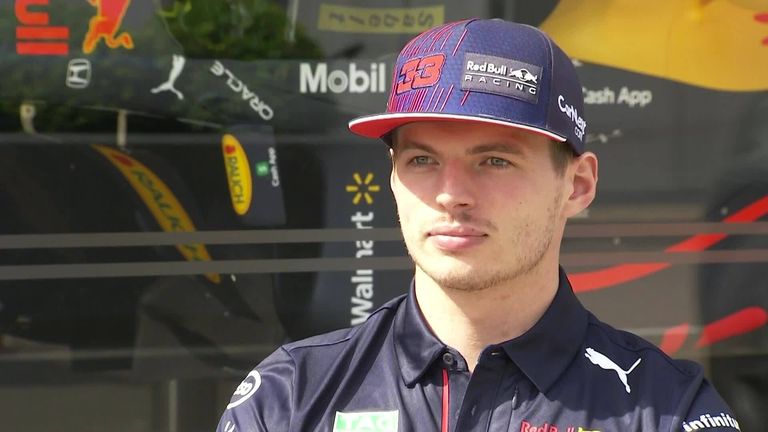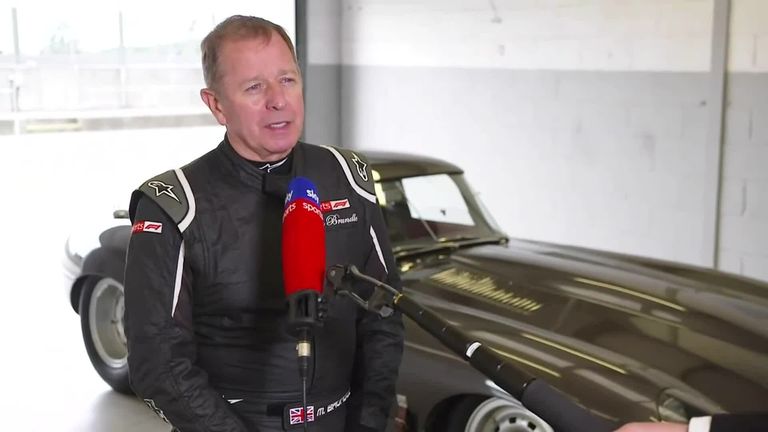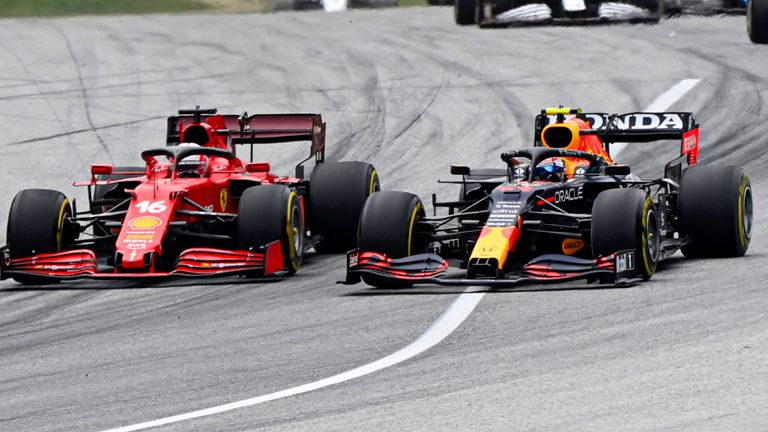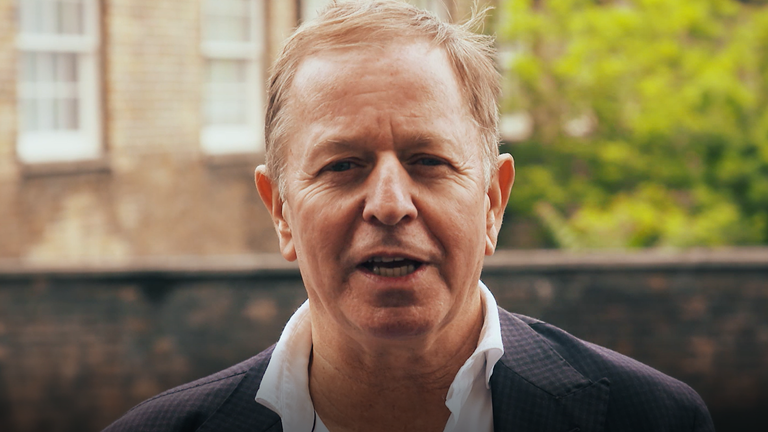
Martin Brundle
Expert Analyst @MBrundleF1
F1 Sprint: Martin Brundle's view on the British GP trial format and how drivers will approach the challenge
Get set for a very-different British GP weekend live on Sky Sports F1. Martin Brundle casts his eye over the new F1 Sprint trial format and the impact it could have as part of the reshuffled schedule for Silverstone
Last Updated: 15/07/21 5:07pm
It's the British Grand Prix… with a difference.
After years of talks in Formula 1 about shaking up the established race format to add more variables into an event, F1 Sprint makes its debut on Saturday afternoon as part of a new-look weekend schedule.
The trial format planned for three races in 2021, with Silverstone being the first, sits in the middle of this weekend with Qualifying on Friday evening and the Grand Prix, as ever, the showpiece event on Sunday afternoon.
- British GP Q&A: Explaining the new race weekend format
- What's on when? Sky F1's live schedule for new-look weekend
- Watch F1's 2022 car launch live on YouTube
Sky Sports F1's Martin Brundle, who has raced in and commentated on numerous formats during his career in F1 and wider motorsport, explains why he believes the sport is right to test the water on something new...
An 'appointment to view' weekend
Qualifying moves to Friday at 6pm with the results of the usual three-part knockout system setting the grid for the brand-new F1 Sprint.
That Saturday afternoon event, starting at 4.30pm, will feature 17 laps of Silverstone, with points on offer to the top three finishers and no mandatory pit stops. The full finishing results set the starting grid for the race. Then it's onto the usual 52-lap British Grand Prix on Sunday afternoon from 3pm.
"I am excited about it as trying a concept like this is something I have talked about for a long time.
"It energises Friday, Saturday and Sunday and makes the whole weekend appointment to view.
"The teams have got so much data and simulations, the driver-in-the-loop simulators, wind tunnels, and so they turn up to races with cars with set-ups that are pretty close to what they need them to be.
"But in this format, if it's raining on Friday for first practice, for example, and they don't get any regular running, we go straight into qualifying a few hours later. I quite like the jeopardy of that.
"The one-hour practice sessions for this year have already energised the spectacle. I know the teams and the engineers are interested in data, but we just want to see the cars on track. Anything that does that and forces them to turn up and deliver on a Friday straight away.
"So let's give it a try. Get them on the track and let the cars race. Who doesn't like a standing start, a mad rush to the first corner, and then battles through the opening laps? So why not try to form the grid up that way?
"I've always thought there should be three different types of race weekend. For example, something like the 'Sprint' weekend, the 'Classic' weekend or the 'Street Circuit' weekend. Formats easy to understand and digest.
"I don't think this sprint format will come in at every race in future as obviously you couldn't do it at Monaco and places like that. But Spa, Monza and all those venues with really big crowds, why not give them something else too."

Why F1's live trial is worthwhile
Although the addition of the Saturday event is a clear break with tradition, F1 has certainly not been immune from tweaking its format over the years. Qualifying underwent almost yearly changes in the mid-2000s, and then briefly again five years ago, before creating the current successful and popular format.
But this weekend will be the first time there are effectively two days of racing, with Saturday sprint followed by Sunday race. But F1 have also made clear this is a live trial and they'll be ready to react with necessary changes for future before giving the green light to any more extensive roll-out for 2022.
"The current knockout qualifying system works extremely well and that's because somebody has been bold enough to change it before.
"I remember commentating with Murray Walker on the old 12-lap, one-hour format and sometimes we didn't see a car for 45 minutes. It would be like the referee blowing the whistle to start England vs Italy and nobody being interested in kicking a ball for the first half. It was just ridiculous.
"Then we had a single lap system where they were all sometimes trying to go slowly to get a better slot in the running order. Drivers also had to carry their race starting fuel, which skewed everything.
"At the start of 2016 we briefly had elimination qualifying but that was a very flawed concept. I think all of us looked at that and took about 20 minutes to work out it was flawed and wasn't going to work. That was fixing something that wasn't broken as far as I was concerned because qualifying works in its current format.
"We've ended up now with what I think is a really good qualifying system that people seem to increasingly enjoy. So that'll still set the grid at Silverstone for the sprint and then we'll have the jeopardy of what follows on Saturday ahead of Sunday's race.
"Okay, pole position in the record books for this weekend will go to the driver who wins the sprint rather than the fastest in qualifying, but I remember Nick Heidfeld being on pole at the Nurburgring but then pitting much earlier than anyone in the race because he had qualified on lower starting fuel, for example.
"We sometimes saw unusual results in the single-lap systems, or we've had people getting lucky with weather in the past, so there has always been something that can mix up the statistics of who's on pole. So I'm not too worried about that.
"Fundamentally I'm right up for giving this a try. As Ross Brawn has clearly said, if this format just doesn't work they'll just switch it off. But it can also be fine-tuned to work if required."

How will the drivers approach the Saturday sprint?
Sunday standing restarts aside, drivers will experience the novelty of two different 'lights out' starts from the Silverstone grid this weekend.
But how will they approach the Saturday sprint, knowing that while some points and higher grid positions for Sunday are on offer, there's also the risk of significant setback to their weekend too if they clash with another car going wheel-to-wheel or make a mistake and crash out?
"I think there is some concern that drivers might just take it easy and take it cautiously, but I think when the lights go out and the adrenaline is pumping they are going to want to try and maximise the opportunity.
"No doubt the engineers will have formed some kind of cunning plan, as they love structured, data-driven solutions. They live by the data and we live by the racing, so I'm hoping the drivers will go like hell.
"Drivers desperately want fourth place on the grid instead of fifth normally so why wouldn't they want fourth place in the sprint instead of fifth?

"Look how hard they go hunting for that extra one point for the fastest lap in the race. They risk a pit stop to fly around the track on another set of tyres to get one additional point. So the three-two-one points system in the sprint for the top three positions is enough of a juicy incentive without it being a fundamental impact on the championship.
"Obviously, our worst-case scenario would be somebody winning the world championship on a Saturday afternoon, but I don't see these events being near the end of the season. Personally, I would use it more at places like Paul Ricard where we tend to have reasonably dull races. But then the 2022 cars have been designed to fix that from what we are told.
"I can understand why the top teams are less enthusiastic because it can only be a problem for them if you think about it. If they can do their normal three sessions of testing through practice, go into qualy and start at the front and disappear into the distance, why would they want the jeopardy of another start and the potential of wheel-banging or losing a front wing? They love certainty.
"But I do believe that grid position, the points on offer and just the honour and competitive spirit of everybody will make drivers and teams go for it."
The new-look British GP weekend
| Date and show | Sky F1 On Air | Session start |
|---|---|---|
| Friday, July 16 | ||
| Practice One | 2pm | 2.30pm |
| Qualifying | 5.25pm | 6pm |
| Saturday, July 17 | ||
| Practice Two | 11.30am | 12pm |
| F1 Sprint | 3.40pm | 4.30pm |
| Sunday, July 18 | ||
| The British GP | 1.30pm | 3pm |
Silverstone's sell-out crowd to witness history
With the British GP venue having been given the green light to run this weekend's event at capacity, and the circuit confirming a sell-out crowd, F1's new format will run in front of a huge live trackside audience at the home of British motorsport in addition to the millions tuned in around the globe on TV.
"Silverstone is one of the few tracks where you get maximum crowds across the whole event and so it's the obvious place to start this new format, really.
"It's going to be appointment to view. Qualifying is at 6pm on Friday evening so people will be thinking let's watch qualifying, then let's watch the sprint on Saturday afternoon, and then we're into the race on Sunday.
"Provided you've still got my car dealer's golden rule in place about never confusing your customer. As confused customers don't buy, they step away.
"You don't want fans not really understanding how we have got this far as we progress through the weekend, but I don't think it will be confusing other than perhaps the tyre allocation.
"I think there is a concern that Practice Two on a Saturday could be a bit lacklustre because qualifying has happened by then, so you'll have a bit of race running. But in these one-hour sessions this year it has just been wall-to-wall F1 cars on the track so I don't know why that would be a whole lot different."

